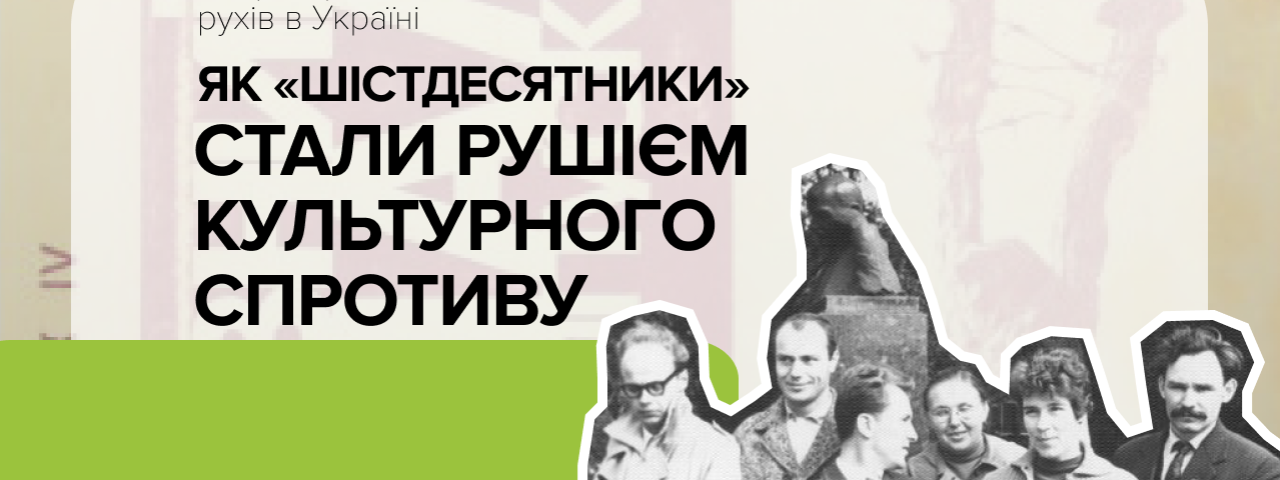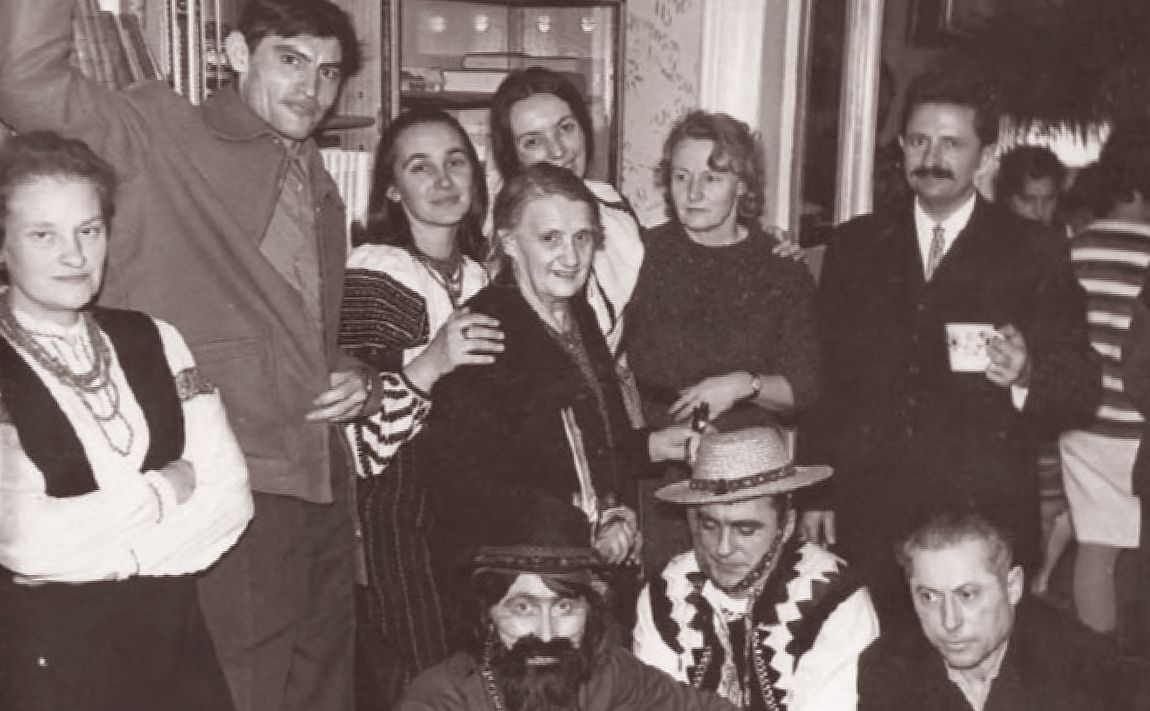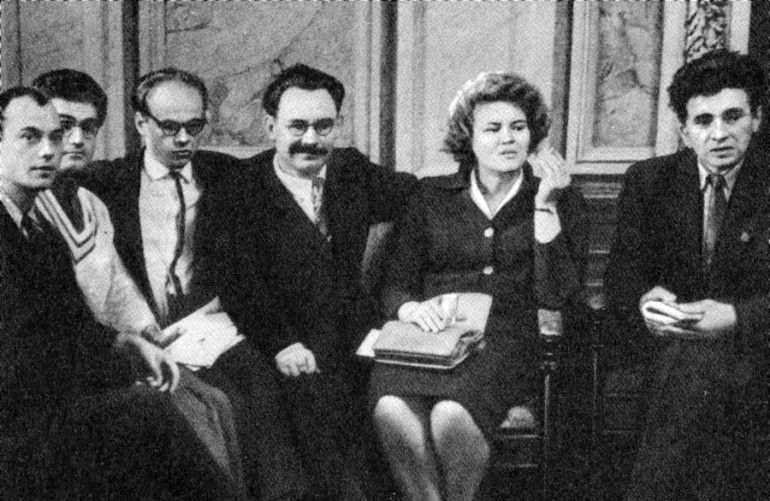How the Sixties became the engine of cultural resistance

The "Sixties" movement is considered one of the most significant political movements in Ukraine in the twentieth century. Rad in the article how it changed the events of the time how it changed the events of the time.
The Sixties movement is considered one of the most prominent political movements in Ukraine in the twentieth century. The "Sixtiers" were a movement of creative young people in opposition to the government, who held new ideas that differed from the official communist ideology and sought to renew the Soviet regime through reforms.
The young Ukrainian intellectuals contributed to the rise of national consciousness and the revival of Ukrainian culture after years of oppression by the Stalinist regime.
The Sixties included Vasyl Stus, Levko Lukianenko, Hryhoriy Tiutiunyk, Alla Horska, Viacheslav Chornovil, Vasyl Symonenko, Serhiy Parajanov, and many others.
Reasons for creation
The first half of the 20th century was a real challenge for Ukrainians: wars, revolutions, occupation by the Soviet Union, artificial famine, political repression, and the devastating Second World War.
After the death of the Soviet dictator Joseph Stalin in 1953, the USSR experienced a so-called "thaw" in the policies of the communist government. Gradual reforms and the easing of repression led to a revival in Ukraine's cultural and scientific spheres.
Young representatives of Ukrainian culture, inspired by the trend of freedom, began to express themselves more openly.
What they fought for
The Sixtiers advocated an evolutionary rather than revolutionary renewal of the system in accordance with Western European ideas of socialism, i.e. the so-called "socialism with a human face".
For them, the priority of human rights, equality of all before the law, and the rule of law over the state (nonsense in the USSR at the time) were important. They fought for the party's non-interference in cultural processes. In addition, they defended the native language and history of Ukraine, and tried to promote the achievements of Ukrainian literature and art.
How they developed
The Ukrainian Sixties movement included numerous groups and organisations. The Sixties created thematic clubs in Odesa, Cherkasy, Dnipro, Zaporizhzhia, and other Ukrainian cities, where they held lectures and meetings. They discussed the problems of the development of Ukrainian culture, art, and poetry. However, the discussions inevitably also touched on Ukraine's acute national problems.

The Sixties movement in Ukraine included many prominent intellectuals, writers, poets, artists, and public figures. In particular, they were:
- Ivan Dziuba — Ukrainian writer, literary critic and literary historian, author of the famous article "Long live the poet!"
- Lesia Horova — Ukrainian poet, author of the collections Garden of My Happiness and Dewdrops.
- Vasyl Stus — Ukrainian poet, literary critic and public figure who was imprisoned in the USSR prison camps and died in prison.
- Mykola Vingranovskyi — Ukrainian poet and translator, author of the collections "Fate" and "White Flowers".
- Ivan Svitlychnyi — Ukrainian writer and literary critic, author of the novel "Music with an Open Heart".
- Myroslav Irchan — Ukrainian poet and translator, author of the collections "Poems about Love" and "Thoughts on a Woman".
Repressions
In early 1963, Khrushchev met with the country's creative intelligentsia, where he sharply accused them of formalism, avant-gardism, and lack of ideas. After that, the Soviet regime began a brutal crackdown on the Sixties movement, using a variety of methods.
The government banned the publication of books, magazines, and newspapers that could be associated with the Sixties movement. It was also forbidden to hold public events, stage plays, screen films and hold concerts that could question the actions of the government of the day.
Members of the movement were persecuted, detained, imprisoned, and some were even sentenced to death.
These measures helped to slow down the movement, but did not completely destroy it. Some members of the movement continued to fight in the shadows, and some emigrated abroad.

The most famous Sixties artists
Vasyl Stus was a Ukrainian poet, literary critic, and public figure. In 1972, Stus was accused of "anti-Soviet agitation and propaganda" and sentenced to 5 years in prison and 3 years of disqualification from holding public office. In 1979, after completing his sentence, Stus was again detained for distributing "anti-Soviet literature" and sentenced to 10 years in a camp and 5 years of disqualification from holding public office.
During his time in the camp, Stus continued to write poetry and essays criticising the Kremlin's policies towards Ukraine and human rights violations. Stus died in the camp on 3 March 1985 from a hunger strike.
Levko Lukyanenko was a well-known Ukrainian nationalist and social activist. In 1961, Lukianenko was sentenced to 10 years in prison for participating in the nationalist movement and attempting to organise an armed struggle against the Soviet regime. While in prison, Lukyanenko continued to fight for the freedom and rights of the Ukrainian people.
In 1968, after his release from prison, Lukyanenko was again detained and sentenced to 5 years in prison and 5 years in a high-security colony for "anti-Soviet agitation and propaganda". Imprisonment and deportation did not stop Lukyanenko from fighting for Ukrainian independence and human rights. In the colony, Lukyanenko continued to write and engage in dialogue with other political prisoners.
The Soviet authorities fought Lukyanenko through repression and restrictions on his freedoms. Nevertheless, his struggle and influence on Ukrainian civil society did not fade away, and Lukyanenko became one of the main symbols of Ukrainian opposition to the Soviet regime. He became a recognised hero of the national movement and contributed to the formation of Ukrainian statehood after the collapse of the USSR.
In 1964, Sergei Parajanov released his brilliant film "Shadows of Forgotten Ancestors", which later led to the director's persecution by the Soviet authorities. After being falsely accused, imprisoned, and ill-treated, the artist nevertheless returned to his pro-Ukrainian activities.
Destruction of the Sixties movement
On the night of 12-13 January 1972, Moscow launched mass repressions against the Ukrainian conscious intelligentsia. The extermination operation against all active Ukrainians was secretly called BLOK. A total of 87 people were arrested. It is believed that after the arrests that the Sixties literary movement completely disappeared.


